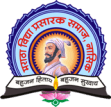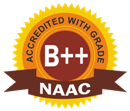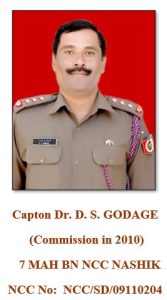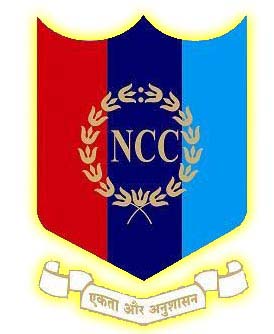About Department
The Department of N.C.C. Studies was established in 2014 in affiliation to Savitribai Phule Pune University. Department offers subject of NCC studies to First and Second Year of B.A./B.Com./B.Sc..
National Cadet Corps (NCC) provides a platform for individual upliftment through the process of channelizing the energy of the youth in constructive pursuits. It also helps the youth to realize the intimate relationship between man and the community. It is an important initiative taken by Ministry of HRD/Ministry of Defense and UGC to introduce NCC as an elective subject at UG level from academic year 2013-14. Our College decided to start NCC as one of the elective courset at UG level from the academic year 2014-15. This interdiciplinary Elective Course is introduced for B.A/B.COM/B.SC/B.Voc as a credit basis semester pattern course namely: NCC STUDIES (Theory and practical papers). It is implemented for three years degree course apart from the : ‘B’ and ‘C’ CERTIFICATE examination conducted by NCC Organization. The NCC department provides several opportunities to the students. It encourages students to participate & organise in various activities throughout the year. To give leadership role in drill practice as parade commander. Gives chance to show demo in practical work like YOGA, P.T, MAP READING etc. Encourages students for attending various prestigious National and International camps and parades like- Republic Day Parade, DRDO Camp, Ek Bharat Shrestha Bharat Camp, Adventure Camp, Thal Sainik Camp, All India Trekking Camp, National Integration Camp, Combined Annual Training Camp/Annual Training Camp, Advance Leadership Camp, Chief Minister Rally. Initiates to assist in organizing Blood Donation Camp, Disaster Relief Camp etc. Motivates to pursue for preparation of competitive examination and S.S.B. interview, to enhance their employability. Provides practical knowledge of Drill & Drill with Arms, Practical knowledge about weapons, Practical involvement in social service activities. The student gets practical knowledge about fire fighting measures, disaster management.
Advantages of the Course :
1) Enhancement of skill and patriotic values among youth.
2) Empowerment of youth and overall personality development.
3) Employability in defence, paramilitary forces and other services.
4) Attainment of qualities of good citizenship and ideals of selfless services.
About The Subject
- The introduction of ‘NCC Studies’ as an optional subject for the Foundation Course was started because apart from NCC regular Training syllabus, it has social relevance in the Indian milieu and has emphasized the overall development of personality.
- Subject’s syllabus includes:-National Integration, Drill, adventure training, environmental awareness, personality development, leadership, and weapon training. Beneficiary the point to be noted here is that all the students will get an opportunity to select credits of their own choice thus making a humble beginning of the ‘choice-based credit system’ in its true sense the facility of ‘credit transfer’.
- Also to reinforce the aims, motto, vision & mission of the NCC through the academic curriculum.
- To instill and inculcate the core values of patriotism, commitment, just and impartial exercise of authority, effective contribution to community development and other social programs, healthy lifestyle practices, habits of restraint & self-awareness & empathy to the needs of socially disadvantaged fellow citizens and above all enduring respect for knowledge, wisdom & power of ideas among the youth.
- To train the students, to be graduates with all-round development, apart from their own subject, can successfully compete in other fields of career such as defence forces & civil services.
- The Department also allows students to join open NCC units like the navy and air force, also gives guidance to ex-NCC cadets to join civil defence basic training sessions and disaster management skill training programs by various associations
NCC History
The NCC in India was formed with the National Cadet Corps Act of 1948. It was raised on 15 July 1948 The National Cadet Corps can be considered as a successor of the University Officers Training Corps (UOTC) which was established by the British in 1942. During World War II, the UOTC never came up to the expectations set by the British. This led to the idea that some better schemes should be formed, which could train more young men in a better way, even during peace times. A committee headed by Pandit H.N. Kunzru recommended a cadet organization to be established in schools and colleges at a national level. The National Cadet Corps Act was accepted by the Governor General and on 15 July 1948 the National Cadet Corps came into existence.
During the 1965 and 1971 wars with Pakistan, NCC cadets were the second line of defence. They organised camps to assist the ordinance factories, supplying arms and ammunition to the front, and also were used as patrol parties to capture the enemy paratroopers. The NCC cadets also worked hand in hand with the Civil Defence authorities and actively took part in rescue work and traffic control. After the 1965 and 1971 Indo-Pak wars the NCC syllabus was revised. Rather than just being the second line of defence, NCC syllabus laid a greater stress on developing qualities of leadership and Officer-like qualities. The military training which the NCC cadets received was reduced and greater importance was given to other areas like social service and youth-management.
NCC Flag
NCC Flag Contains NCC Crest in gold in the middle, with the letters “NCC” encircled by a wreath of seventeen lotus with a background in Red, Blue and Light blue.Red depicts the Army, Deep Blue depicts the Navy and Light Blue depicts the Air Force. The seventeen lotuses represent the 17 State Directorates. “Unity and Discipline” (Ekta aur Anushasan) is written at the bottom of the NCC Flag.
NCC SONG
HUM SAB BHARTIYA HAI, HUM SAB BHARATIYA HAI
APNI MANZIL EK HAI,
HA HA HA EK HAI, HO HO HO EK HAI,
HUM SAB BHARTIYA HAI
KASHMIR KI DHARTI RANI HAI, SARTAJ HIMALAY HAI
SADIYON SE HAMNE ISKO APNE KHOON SE PALA HAI
DESH KI RAKSHA KI KHATIR, HUM SHAMSHEER UTHA LENGE
HUM SHAMSHEER UTHA LENGE
BHIKRE BHIKRE TARE HAI HUM LEKIN JILMIL EK HAI
HA HA HA HA EK HAI, HUM SAB BHARTIYA HAI
MANDIR GURDWARE BHI HAI YAHAN, AUR MASZID BHI HAI YAHAN
GIRJA KA GHADIYAL KAHIN MULLA KI KANKHI HAI AJHA
EK HI APNA RAM HAI, EK HI ALLAH THALA HAI
EK HI ALLAH THALA HAI
RANG BIRANGE DEEPAK HAI HUM, LEKIN MAHAFIL EK HAI
HA HA HA EK HAI, HO HO HO EK HA
HUM SAB BHARTIYA HAI, HUM SAB BHARTIYA HAI
Centrally Organized Camps
- Leadership Camp
- DRDO Camp
- Adventure Camp
- Rock Climbing Camp
- Trekking camp
- National Integration Camp (NIC)
- Thal Sainik Camp (TSC)
- Army Attachment Camp (AAC)
- Republic Day Camp (RDC)
- Annual training Camp (ATC)
Training
Drill, shooting, Physical fitness, map reading, First aid, Gliding/Flying, boat pulling, sailing and camp training covering basic of military training in Army, Navy and Air Force.
This training is mostly carried out in schools and colleges by the cadets. In addition, depending upon the type of service, basic knowledge of that service is imparted to the cadets e.g gliding , powered flying for Air Wing cadets and boat pulling, sailing for Naval Wing cadets form part of institutional training. These activities comprise approximately 50% of the entire syllabus.
This is the most imp aspect of NCC Trg and hence great emphasis on institutional trg to be given. State DDG’s to issue comprehensive instrs on organising the Institutional Trg at Gp / Unit level.
Following actions will be taken to improve the standard of training.
1.Optimum utilization of PI Staff for Training.
2.Greater involvement of Officers, WTLO’s and ANO’s.
3.Deficiencies in training aids will be made up expeditiously.
Basic Training
1. Drill
Cadets must be made to understand the aim and purpose of teaching drill, so that they are suitably motivated and do not take it as “fatigue”. Emphasis will be laid on correct bearing, marching, saluting and arms drill. Inter-squad competitions may be organized to create interest.
2. Weapon Training
Cadets generally take keen interest in weapon training and firing. Units must liaise with nearby Service and Para-Military Units to ensure that all cadets get an opportunity to fire their authorized amination. Use of firing simulators may be made to optimize training efforts where possible.
3. Adventure Training
Adventure activities have been incorporated in NCC training with the aim of inculcating and strengthening leadership traits amongst the cadets. These activities in NCC can be broadly divided into the following.
1. Land based – Mountaineering, Rock Climbing, Trekking.
2. Water based – Sailing Expedition, White Water Rafting, Scuba Diving, River Crossing.
3. Air based – Parasailing.
NCC Social Service Activities
NCC has adopted community development activities with the aim of imbibing amongst cadets selfless service to the community, dignity of labour importance of self help, need to protect the environment and to assist weaker sections of the society in their upliftment. This was envisaged through programmes involving
- Road Safety Awareness Rally
- Voter Awareness Rally
- Sadbhavana Rally
- Tree plantation
- Blood donation
- Anti Dowry Rally
- Anti Female Infanticide Pledge
- Anti Leprosy Drive
- AIDS Awareness Rally
- Visit to Old Age Homes
- Slum clearance
- Disaster Management & Relief
- Village upliftment and various other social schemes.
Certification Programme
General
The eligibility conditions and the general procedure for the conduct of the Certificate Examination for Cadets of Senior and Junior Division/Wings NCC (All wings) have been issued by this HQ from time to time. The aim of this Directive is to consolidate all such instruction and revise these, where necessary.
Type of Examination
The type of Certificate Examination and the unit in which these are held are given below
Type of Certificate :
- Certificate ‘A’ (Junior Division/Wing NCC )
- Certificate ‘B’& ‘C’ (Senior Division/Wing NCC)
Eligibilities for Certificate Examination:
For “A” Certificate Examination (Junior Division)
- Must be in Second year of NCC
- Must have attended an Annual Training Camp
- The candidate must have attended a minimum of 75% of total Training periods laid down in the syllabus for the first and second years of Junior Division/Wing NCC(All wings)
- Break in the NCC Service of the cadet prior to his appearing. In the examination ‘should not exceed more than 12 month at one time, to count his previous service. In case the break exceeds 12 months, the following procedure will be adopted”If he has been on the unit rolls for a minimum of two years before his discharge and had attended 75% of the total period during his NCC Service he will need another 45 periods of training to become eligible for certificate ‘A’ examination. In all other cases where above conditions are not fulfilled, the cadet must attend a minimum of 75% periods of the first and second year of training”.
For ‘B’ Certificate Examination (Senior Division)
- The Cadet must be in second year of SD/SW NCC Training
- Must have attended one Annual Training Camp/NIC/Attachment training with regular Army, Navy, Air Force Units.
- Cadets possessing ‘A’ Certificate will be awarded 10 bonus marks.
- The cadet must have attended a minimum of 75% of total training period laid down in the syllabus for the first and second years for Senior Division Wing NCC (All Wings). Break in the NCC service of the cadet SD/SE prior to appearing in the exam should not exceed more than 18 months at one time, after his discharge to count his service for Certificate ‘B’ Examination. In case the break exceed 18 months the following procedure will be adopted. “If he had been on the unit rolls for a minimum of two years before his discharge and had attended 75% of the total periods during his NCC service he will need another 45 periods of training to become eligible for certificate ‘B’ Examination. In all other cases where above conditions are not fulfilled, the cadet must attend a minimum 75% periods of the first and second years of training.”
For ‘C’ Certificate Examination (Senior Division)
- Cadet must have passed ‘B’ certificate.
- The Cadet must be in second/third year of SD/SW NCC Training
- The Cadet must have attended a minimum of 75% of the periods of 3rd year syllabus during the academic session.
- Break in the NCC Service of the SD/SW Cadet prior to appearing in the exam should not exceed more than 18 months at one time, after his discharge to count his previous service for Certificate ‘C’ examination. In case the break exceeds 18 months, the following procedure will be adopted, If he had been on the Unit rolls for a minimum of two years before his discharge and had attended 75% of the total period during his NCC service, he will need another 45 periods of training to become eligible for Certificate ‘C’ examination. In all other cases where above conditions are not fulfilled, the Cadet must attend a minimum of 75% periods of the first and second year of training.”
- Must have attended two Camp.
Permission to Appear in Certificate Examination after Discharge
- Cadets who ceased to be on rolls of NCC may be permitted to appear for certificate ‘A’ Examination for Junior Division/Wing and ‘B’ & ‘C’ for Senior Division/Wing NCC at their own expenses within a period of 12 months of their discharge from the NCC, provided they were otherwise eligible at the time of their discharge. The ex-cadet so eligible can appear for the examination at any place in India by applying for the same, alongside with discharge certificate, to Local Unit Commander. The Group Commander is empowered to accept such requests from the ex-cadets.
- Re-Test for Improvement of Grading : ‘C’ Certificate
- With a view to give Cadets a chance to apply for the NCC Special Entry Scheme, in case their grading improves, itkl has been ruled that
- Cadets who have obtained a ‘C’ grading in NCC ‘C’ Certificate Exam and who wish to improve their grading will be allowed to appear for a retest.
- Only one retest will be allowed.
- Cadets will have to re-appear in complete examination.
- Retest will be held alongwith fresh cases nexe year. During the period, these Cadets may attend at least two weeks’ Special Parade/Coaching classes to be organised by units after he academic session. Those Cadets who do not attend the Special Parade/Classes will also be eligible to appear in the re-test. No refreshment or other allowance will be admissible for these classes/parade/retest.
NCC ARMY WING (BOYS)
BENEFITS OF NCC
(A) Employment field:-
1)‘C’ certificate holder of N.C.C cadets are exempted from written examination they can directly appear for SSB for Army/Navy/Air Force as Commissioned officer.
2) Indian Air Force Flying branch carryout special entry for NCC ‘C’ certificate holders (Air Wing).
3) Indian Navy carryout special entry for ‘C’ certificate holders (Naval Academy).
4) NCC cadets arte given preference in enrollment of soldiers.
5) ‘B’ & ‘C’ certificate holders are given preference in state police service.
6) 5% reservation for Gp ‘C’ & ‘D’ post (State Govt /undertaking)
(B) Academic Field:-
1) Bombay University giving 10 grace marks to NCC cadets appearing at various degree examination.
2) 2% marks are given NCC cadets by MAH University.
3) 3 marks given for adm in medical college.
4) Admission to polytechnic college 15 vac reserve for NCC cadets.
5) Weightage of 4 marks for admission in ITI
(C) Scholarship for NCC Cadets :-
1) Sahara Scholarship – Rs. 6000, Rs. 12000.
2) Sahara professional Rs. 30000.
3) CWS Scholarship – Rs. 6000.
4) Chief Minister Scholarship – Rs. 2000, Rs. 6000
5) Shyam Benegal Scholarship – Rs. 10000.
STRENGTH OF CADETS
|
Year |
SD | SW | Total | ||||||
| I | II | III | Total | I | II | III | Total | ||
| 2019-20 | 17 | 11 | 09 | 27 | 05 | 05 | 03 | 13 | 50 |
| 2020-21 | 11 | 16 | 10 | 37 | 03 | 05 | 05 | 13 | 50 |
| 2021-22 | 09 | 11 | 15 | 35 | 09 | 03 | 03 | 15 | 50 |
| 2022-23 | 18 | 09 | 03 | 29 | 10 | 08 | 03 | 21 | 50 |
| 2023-24 | 14 | 15 | 04 | 33 | 04 | 10 | 03 | 17 | 50 |
STRENGTH OF CADETS PASSED B-CERTIFICATES
| YEAR | SD | SW | TOTAL | PERCENTAGE |
| 2019-20 | 15 | 03 | 18 | 73.33 % |
| 2020-21 | 15 | 05 | 20 | 93.75 % |
| 2021-22 | 03 | 03 | 06 | 36.66 % |
| 2022-23 | 06 | 03 | 09 | 66.66 % |
| 2023-24 | – | – | – | – |
STRENGTH OF CADETS PASSED C-CERTIFICATES
| YEAR | SD | SW | TOTAL | PERCENTAGE |
| 2019-20 | 10 | 05 | 15 | 83.33 % |
| 2020-21 | 15 | 03 | 18 | 100 % |
| 2021-22 | 12 | 04 | 16 | 80 % |
| 2022-23 | 03 | 03 | 06 | 66.66 % |
| 2023-24 | – | – | – | – |
CADETS PARTICIPATD IN CAMP
| YEAR | ATC | NATIONAL CAMP | TOTAL |
| 2019-20 | 28 | 01 | 29 |
| 2020-21 | 36 | 00 | 36 |
| 2021-22 | 32 | 00 | 32 |
| 2022-23 | 23 | 09 | 32 |
| 2023-24 | 32 | 10 | 42 |
CADETS SELECTED IN ARMED FORCES
| Year | No. of Cadets Selected in Army | No. of Cadets Selected in Police |
| 2019-20 | 04 | – |
| 2020-21 | – | – |
| 2021-22 | 03 | – |
| 2022-23 | 03 | 02 |



